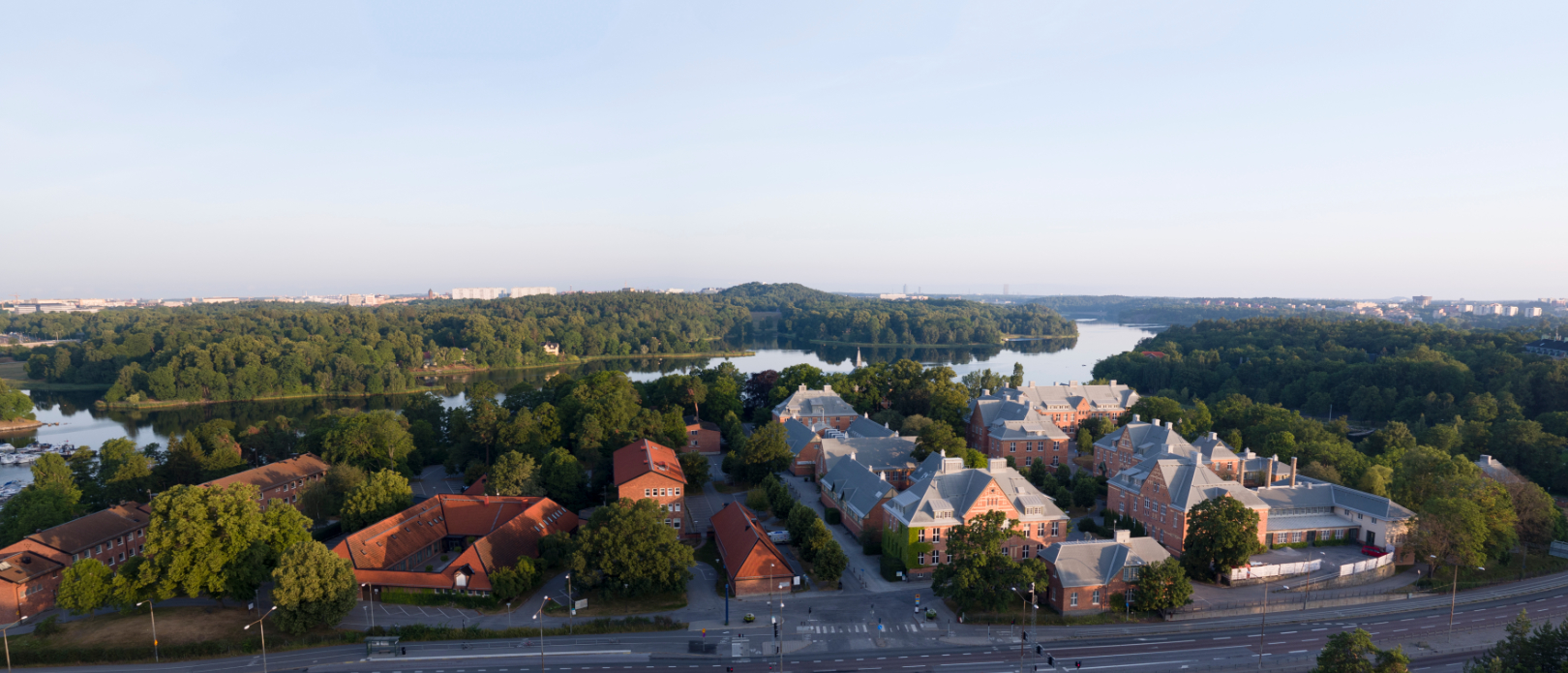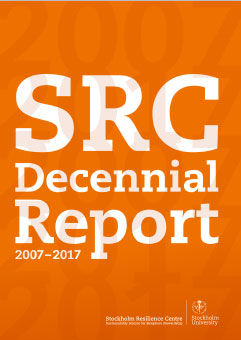
Stockholm Resilience Centre
Bildtext får vara max två rader text. Hela texten ska högerjusteras om den bara ska innehålla fotobyline! Photo: B. Christensen/Azote
Funding
Funding boost for centre researchers
Several new and exciting projects will be initiated
Text
Centre researchers Maja Schlüter, Maria Mancilla Garcia, Tilman Hertz and Emilie Lindkvist were awarded 18,5 million SEK by the Swedish Research Council (VR) to bring together researchers from the social and natural sciences and philosophy to analyze and compare approaches to causation from different disciplines and investigate their implications for the study of complex, intertwined SES. The work will be carried out in partnership with the Institute of Analytical Sociology (Linköping University), Department of Philosophy (Uppsala University) and Department of Ecological Modelling (UFZ-Helmholtz Centre for Environmental Research, Leipzig/Halle, Germany). The research will combine multiple methods including philosophical explication, empirical analysis, network and agent-based modelling in an iterative way to develop and test thinking about complex causal processes.
"The research environment brings together fields that rarely intersect to build a foundation for deeper understanding of social-ecological problems and their governance," Schlüter says.
Resilience practice for civil servants
The Swedish Research Council FORMAS also granted in November several centre researchers with funding for their proposed projects. Here are some of them:
Albert Norström, My Sellberg and Louise Hård af Segerstad received funding for a pilot training programme in resilience practice aimed at civil servants from municipalities, county councils and regions in Sweden. The project will pave the way for utilizing resilience practice approaches and methods within strategic societal planning in Swedish governance organizations. The project will also strengthen networks between resilience practitioners and researchers, which could be the foundation for a community of practice.
"We aim to have five organizations participating in the training and the results of the project will be co-produced with them. In the end, we will synthesize our lessons and disseminate our findings to a broader audience of interested stakeholders," My Sellberg explains.
The new normal in the Arctic
Caroline Schill and Simon West, researchers based at the Beijer Institute of Ecological Economics at the Royal Swedish Academy of Sciences and the Department of Systems Ecology at Stockholm University respectively, recieved funding for a project called 'Living with the 'new normal': exploring human responses to abrupt environmental change in the Arctic using behavioural and interpretive social science'.
The project brings together behavioural and interpretive social science to explore, together with Alaskan Inuit communities, their responses to a changing Arctic. Schill and West will first use participatory photography to enable participants to identify the environmental changes that matter most to them.
"Building on that knowledge, we will design behavioural economic experiments to study the effects of different scenarios of change on actual behaviour. Through this approach, we aim to empower communities to reflect, share experiences and devise strategies to live with change and uncertainty," they explain.
Understanding a new reality for small-scale fisheries
Caroline Schill was also on the receiving end of another funding, this time with colleagues Nanda Wijermans, Maja Schlüter and Therese Lindahl, the latter a researcher based at the Beijer Institute of Ecological Economics. Their project will dentify critical multi-level processes for sustainable small-scale fisheries. These fisheries are often referred to as traditional, artisanal, low-tech, labour intensive, low capital operations that contribute about 50% to the global fish catch and jobs for millions of people. They are vulnerable to climate change effects, e.g. changes in abundance, variability and predictability of fish stocks.
The ability of fishers to deal with this new situation will crucially depend on the capacity of fishers to adapt individually and collectively, which in turn is affected by how fishers perceive this new situation individually and collectively.
However, little is known about the interplay between cooperation and sustainable resource use in this new situation. To study these interactions holistically, Wijermans and her colleagues will use agent-based modelling to represent, simulate and analyse the role and effect of individual and situational heterogeneity on multiple levels.
Exploring the future we want
Postdoctoral researcher Jan Kuiper will together with Lisen Schultz, Perrine Hamel (Stanford University (researcher) and Laura Pereira (City University London) explore diverse, credible and positive scenarios for navigating transformation under the 2030 Agenda. Under the name "The future we want" the project will develop and pilot an online database that will offer a global collection of local social-ecological scenarios.
"Such a database will enable us to start looking into the diversity of perspectives on sustainable development, and to better understand interactions between the SDGs in different social-ecological contexts," Kuiper explains. It will draw on experiences from the Seeds of a Good Anthropocene project, the quantitative tools developed by the Natural Capital Project, and the rich experiences gained through a decade of research on adaptive co-management in Swedish Biosphere Reserves.
Combining conservation with development
Jamila Haider was awarded a 3,1 million SEK international postdoc grant from the Swedish Research Council (VR) for the project “Development as coevolution: How can resilience inform sustainable development in biocultural landscapes?”. The purpose of the grant is to give early-career researchers with a doctoral degree from a Swedish university the opportunity to expand their networks internationally. In her research Jamila will investigate why interventions to improve well-being often fail to account for the coevolved relationships between social and ecological dynamics that create and sustain biocultural diversity. Using a novel combination of participatory methods around food preparation, the project will study the resilience of family farms in two very different biocultural landscapes: the Pamir mountains of Tajikistan and the Austrian Alps. By combining insights from theory and practice, the project will ultimately help inform how interventions can better integrate the conservation of biocultural diversity with development opportunities. Haider will partner with colleagues from University of Central Asia in Tajikistan, University of Sheffield and International Development Studies at University of Sussex in UK, and University of Natural Resources and Life Science in Austria.
Identifying vulnerable coral reefs
In a joint call from BiodivERsA and the Belmont Forum, centre researchers Steven Lade and Thorsten Blenckner and 2,5 million SEK to identify the most vulnerable reef social-ecological systems on Earth. The project, which is led by David Mouillot at University of Montpellier, aims to move beyond the typical over-simplified ‘human impacts’ storyline and focus on uncovering new solutions based on a prospective and integrated modelling approach of reef social-ecological systems at the global scale.
Financial dimensions of climate 'wild cards'
Beatrice Crona, Victor Galaz, Örjan Gustafsson and August Andersson, researchers based at the Global Economic Dynamics and the Biosphere at the Royal Swedish Academy of Science, the Stockholm Resilience Centre and the Bolin Centre’s Department of Environmental Science and Analytical Chemistry (ACES) at Stockholm University respectively, received funding for a project called, ‘Financial Dimensions of a key climate system “Wild Card”: The Atmospheric Brown Cloud over South Asia’.
The project will address a climate ‘wild card,’ meaning an earth system phenomenon that can trigger abrupt changes in the climate. Specifically, they will look at the climate-affecting Atmospheric Brown Clouds (ABC) over South Asia.
“Building on decade-long investigations of the air pollution-climate change nexus across South Asia, we will couple state-of-the-art models of emission sources with a novel methodology to identify key financial mechanisms and actors underpinning activities driving the ABC,” they explain.
This will form the basis for a dialogue with key stakeholders, including the Indian Institute of Science, in the financial sector and policy on how financial flows can be redirected to shift away from contributing to climate risks, to enhancing climate stability.
Ten years of cutting edge science
Over the past ten years Stockholm Resilience Centre has not only developed into a world-leading sustainability science centre but has also spurred new thinking on sustainability within business sectors and international policy arenas. Read more about our work in our Decennial report.







